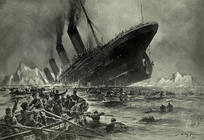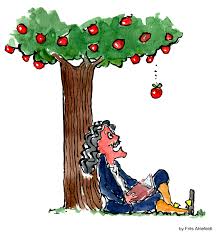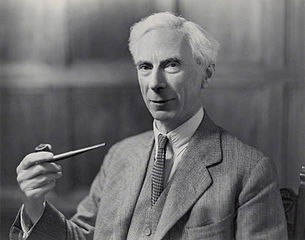 Source: Wikipedia.commons
Source: Wikipedia.commons It is surprising to find that this book was written in 1912 - the same year that The Titanic sank - because the writing is still so fresh and the ideas seem so relevant to today. I suppose that is because of the nature of the book - it sets out ask questions about the some of the most fundamental areas of philosophy that mankind has been thinking about since Plato and before. Many of these questions can never be satisfactorily answered but, as Russell himself says at the start of the book: “Philosophy, if it cannot answer so many questions as we could wish, has at least the power of asking questions which increase the interest of the world, and show the strangeness and wonder lying just below the surface even in the commonest things of daily life” (Page 6).
 source: Flickr.com
source: Flickr.com In the first chapters he employs Cartesian doubt (a process that he declares is “still useful to all students of [Philosophy] (Page 8)) to assess our knowledge of the physical world. He then suggests that we build up an understanding of the world around up by using “sense-datum”; for example by observing a table we gain sense-data such as about its colour, texture and hardness etc. We then use a rational process of inference to get to an understanding of the physical world.
What I found intriguing was that Russell, when he goes on to talk about Universals and Particulars (universals are what particulars exemplify for example whiteness, hardness or relations like “being besides”) I expected him to be against the notion of universals as too much of a metaphysical concept, however he is happy to accept them. He is supportive of our natural inclinations to conceptualise reality and in the chapter on Induction, does a good job of rationalising why humans are so adept at creating universals from particulars. So it is that he is not like a Platonist, arguing that universals exist in a real (or even more real) sense than the world around us, rather it is the human mind that constructs universals from our everyday experiences.
The final chapter of the book is cracking! Entitled “The Value of Philosophy” it is worth reading on its own even if you don’t read the rest of the book. Again it seems very modern as he begins by addressing the fact that “many men, under the influence of science or of practical affairs, are inclined to doubt whether philosophy is anything better than innocent but useless trifling, hair-splitting distinctions, and controversies on matters concerning which knowledge is impossible” (Page 89 - it sounds a lot like Dawkins' criticisms of Theology!). In response he sets out to show the value of our subject. He does this not by slating the physical sciences (and so avoids the “them and us” mentality) but rather suggests that philosophy, by its nature, is not able to produce the “definite body of truths” produced by more “practical” subjects. Indeed, Russell points out that whenever philosophy has begun bear fruit and produce a body of knowledge that it has split off to become a separate subject; so it is that “The whole study of the heavens, which now belongs to astronomy, was once included in philosophy; Newton's great work was called 'the mathematical principles of natural philosophy'. Similarly, the study of the human mind, which was a part of philosophy, has now been separated from philosophy and has become the science of psychology” (page 90).
But is it not just this legacy that excites Russell, it is also that philosophy continues to ask questions that are beyond human powers of reasoning and so it is that the value of philosophy is to be found largely in its very uncertainty. As Russell says:
“The man who has no tincture of philosophy goes through life imprisoned in the prejudices derived from common sense, from the habitual beliefs of his age or his nation, and from convictions which have grown up in his mind without the co-operation or consent of his deliberate reason. To such a man the world tends to become definite, finite, obvious; common objects rouse no questions, and unfamiliar possibilities are contemptuously rejected. As soon as we begin to philosophize, on the contrary, we find… that even the most everyday things lead to problems to which only very incomplete answers can be given. Philosophy, though unable to tell us with certainty what is the true answer to the doubts which it raises, is able to suggest many possibilities which enlarge our thoughts and free them from the tyranny of custom. Thus, while diminishing our feeling of certainty as to what things are, it greatly increases our knowledge as to what they may be; it removes the somewhat arrogant dogmatism of those who have never travelled into the region of liberating doubt, and it keeps alive our sense of wonder by showing familiar things in an unfamiliar aspect” (page 91)
Russell argues that philosophic contemplation and the development of our minds and thinking about the self so that we ultimately become “not-self” (Page 92-93) is fundamentally important for humans having any possibility of “union with the universe which constitutes its highest good” (page 94). His thoughts sound very close to Buddhism towards the end of the book (see this article from Philosophy Now) - certainly the text fits well with the fact that Russell was a self-declared agnostic - yet still a truth seeker even if he is unable to find the answer. As Russell himself sums up:
“Philosophy is to be studied, not for the sake of any definite answers to its questions since no definite answers can, as a rule, be known to be true, but rather for the sake of the questions themselves; because these questions enlarge our conception of what is possible, enrich our intellectual imagination and diminish the dogmatic assurance which closes the mind against speculation; but above all because, through the greatness of the universe which philosophy contemplates, the mind also is rendered great, and becomes capable of that union with the universe which constitutes its highest good” (page 92ff)
(All page references made here are to the 2001 OUP edition of the text)



 RSS Feed
RSS Feed
